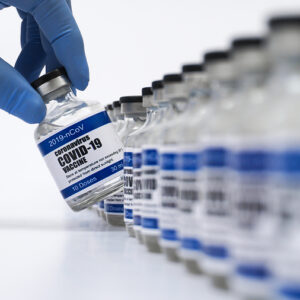Whether it’s internet rumors about Bill Gates, fear of the unknown, or merely being prudent, the reluctance of a large swath of people, particularly those whose who deal with nursing home patients and inmates, to be vaccinated might be endangering those vulnerable populations.
The push continues for age-eligible Americans to get the COVID-19 vaccine. And that is especially the case in Pennsylvania, which continues to be a COVID-19 hotspot. One area of concern involves nursing homes. A March to April survey by the state Department of Health found nearly 79 percent of residents have been vaccinated alongside 54.64 percent of staff, which includes any employee, contractor, or volunteer in a facility.
These percentages may seem like a lot considering a vaccine was not an option mere months ago, but long-term care providers throughout the commonwealth say they are struggling to vaccinate new residents and staff. Pennsylvania Health Care Association (PHCA), which commissioned the survey, chalks it up to the expansion of the vaccine to all adults in Pennsylvania as well as the federal government’s pause of the Johnson & Johnson vaccine.
PHCA conducted a survey of 83 of its members and identified 5 percent of residents and staff in nursing homes, assisted living communities and personal care homes are still waiting for the opportunity to receive the COVID-19 vaccine. Thirty-fice percent of respondents were still trying to develop plans to secure vaccines, especially as new residents and newly-hired workers need to be vaccinated. Without a plan, PHCA president and CEO Zach Shamberg says, “We risk the return of another spring urge and the lives of thousands of long-term care residents.”
“Prisons, nursing homes, and other locations where people are living in high population density amongst each other pose a much higher risk to their residents for acquiring COVID than those in the general community,” said Dr.Eric F. Hussar, Pennsylvania director of the American Academy of Medical Ethics. “Those who work in these areas thereby also have a higher risk of exposure, and subsequently for passing it on to fellow staff, or those they are serving. These employees are highly recommended to receive COVID vaccinations, given the very low incidence of side effects, as well as the effectiveness of the vaccines for preventing COVID and its complications. For those who are hesitant, we would strongly recommend a discussion with their physician in order to clarify fears and dispel any misunderstanding about the benefits and risks of the vaccinations.”
And like nursing homes, Pennsylvania prison staff are woefully under-vaccinated.
The Inquirer reported 80 percent of correctional staff and officers are not vaccinated or have not reported their status. Like nursing homes and long-term care facilities, prisons are also considered “hot spots” for COVID-19.
“(It’s) because inmates live so close together,” according to the Department of Corrections website. “By any reasonable standard, incarcerated people should rank high on the priority list because when outbreaks occur inside prisons, they can endanger people on the outside, too, (and) prison staff members can carry the virus to their family members and ultimately the community.”
While no prison employer or inmate is required to get the vaccine, the corrections department will deposit $25 into an inmate’s account once an inmate receives both doses. As for prison workers, they are offered paid time off for getting their COVID-19 vaccine.
While it may be an issue of workers not self-reporting that they have been vaccinated, Pennsylvania’s prison workers would not be the only professionals taking their time getting vaccinated, if they even plan on getting jabbed. Some 30 percent of Americans do not intend on getting a COVID-19 vaccine according to information in February from Pew Research Center. In January, Associated Press reported “surprising numbers of health care workers” were “refusing shots.”
“I do not think anyone wants to be a guinea pig,” 42-year-old cardiothoracic surgeon Dr. Stephen Noble told the AP. “At the end of the day, as a man of science, I just want to see what the data show, and give me the full data.”
Objections to getting the vaccine for COVID-19 were so bad in January that AP said some hospitals were offering things such as free breakfasts at Waffle House and a raffle for a car.
Even Marines are turning down the vaccinations — 48,000 Marines to be exact. Details on the reasoning were not immediately clear, although Military Times said this month that vaccine misinformation on social media was a concern.
The union representing prison workers in Pennsylvania did not specify to Inquirer.com why its members are not getting vaccinated. It was also mum on what if anything it has been doing to increase vaccinations. While some unions have worked to get their members near the front of the line, The Hill said in January that it remained possible some members may push back on vaccinations becoming mandatory for employment. Union members would not be alone. A February Pew Research Center study found 57 percent of people in the U.S. are against a government requirement to get a COVID-19 vaccine.

